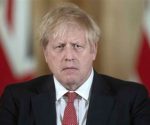UK Government is going to install a Fake Brexit enacting Tory executive; don’t rubberstamp it by voting
Where are the plaudits for FBEL? A rhetorical question, of course: in Britain, when one is correct against the grain of disinformed opinion, wishful thinking and plain idiocy, and then in the face of sore feelings caused by intellectual investment proved mistakenly spent, then one will assuredly be wrong in the future, and not worth the looking at. This is how it works with the perverse and cretinous British; thus, the alternative media or political celebrities who lead their audience a merry dance are the greatest thing since sliced bread. What is important, you see dear reader, is the all being wrong together. Perverse and cretinous.
Since 2016, this site has been alone in explaining that the Tory executive, naturally acting as agent of the UK Government (the British military intelligence/financier-corporatist amalgam), wanted to create an illusion around Britain’s exit from the EU as ordered by the British people in the result of the referendum on the issue of membership. The country would be out of the EU in name, but actually bound to it by standardisation and superiority of EU legislation (made into British law when it couldn’t be made to apply by treaty). And this made sense, because if the UK Government decided to flagrantly disobey the will expressed in the referendum, it would put a wrecking ball through the system by which it ruled.
While this viewpoint was constructed from examining Government white papers from day one after the referendum, and by common sense, it wasn’t right – according to the viewpoint arrived at by the febrile unthinking grapevine encouraged by disingenuous alternative media. Britain would leave the EU, but be made to go back in. Or Britain wouldn’t be allowed to leave the EU – there would be a referendum, and this would rule leaving out.
This year, this site has been pointing out that the UK Government has been engaged in an operation, mostly using the threat of a second referendum, to engineer tolerance of the Article 50 treaty. In other words, dear reader, any talk of the second referendum was supposed to engender feelings of relief about the second worst option to not leaving at all: i.e. the Tory executive’s Withdrawal Agreement. Please consider for a moment how successful this campaign has been. The oily Delingpole, whose job at Breitbart has always been to bamboozle the Telegraph-rejecting and UKIP-sympathising types back into the Tory fold, can now write the following:
They [an opinion poll and a single local election result] are telling us that, regardless of the Brexit Party’s disgusted protestations, the Brexit-voting public has largely bought into the idea that Boris’s deal is real Brexit and that the Conservatives are the best hope of delivering it.
It’s very significant that the opinion polls, now consistently showing that the Tories will win the 2019 general election, have been interpreted in the way that has here been done: for, it doesn’t matter if it is true or not that the Brexit-voting public has tolerance for the Fake Brexit (as it has been termed hereabouts) enough to enthusiastically vote for the Tories. What matters is that there is an illusion of it. The opinion polls, all showing these days a large margin for the Tories ahead of Labour, are instructing the public in this illusion: not only are they telling people what to expect (and the reader will be reminded in a moment how easy it is to fix an election), but also how to make that outcome meaningful, with the narrative being that people have accepted any Brexit as being better than none. Ultimately, the engineering of tolerance for the Article 50 treaty has culminated in a place where the acquiescence is to be demonstrated by an election win for the Tories.
While other predictions made at FBEL related to the so-called Brexit leaving date of October 31st have come to pass, the factoring in of an election proved to be a difficult thing to do. The author has always insisted that there would not be a no-deal Brexit, and specific to the last day of October, he deduced that an extension beyond it was likely in order to ratify the Withdrawal Agreement. What was not seen, however, was how an election would be held ahead of the ratification. But this is what happens when, in one’s thinking, one forgets that the House of Commons to the UK Government is like the Red Sea to Moses – it parts ways, and then rejoins itself on command. The enormous significance of the Withdrawal Agreement being ratified after an election instead of before is that the Leave-voting public can be made to endorse it in an act of emotional reflex and without needing, or indeed wanting to know what it would entail (which would be a state of forever-EU undeadness: out, but not out for as long as UK Government wills it).
To read the corporate-media, one would think that the big issue of the moment is whether or not the Tories can create a Commons in which it can ratify the Withdrawal Agreement without hindrance – and this is the pretext by which there is a good deal of discussion about the impact of the Brexit Party (the truth is that the Brexit Party is going to make no difference whatsoever, but is merely a means by which to encourage turnout – but there will be more on this momentarily). As usual, all the noisy circus distracts from the real issue: that the election will produce a Commons that will ratify the Withdrawal Agreement, and as such the British people will have been seen to signal consent for it.
In the previous parliament, UK Government certainly did need a numerically large opposition in order to make plausible the failure of a Tory executive to have free rein to deliver the complete Brexit that Leave-voters expected. Naturally, this was predicted at FBEL too:
The General Election to be held on June 8th [2017] has been called to shore up Parliament for a continued fudge of the Britain’s exit from the EU, or to deliver a Fake Brexit.
Furthermore, the author has explained how it is perfectly possible for UK Government to engineer a Commons in exactly the form it wants:
However, if you are planning a parliament to perform a particular job – which, as we can see now, meant giving the Executive branch enough power to fudge Brexit – then it would be harmful to let anything whatsoever go [i.e. too many seat changes would not be desirable for UK Government]. All it would have needed, in 2017, to make circumstances favourable for a British Government plotting to bring about Fake Brexit was one or two critical seats changing from Tory to Labour [in places where efforts in defence of the incumbent would not be so energetic].
In 2019, the UK Government does not need to concern itself about restricting a result; bar any surprises, a reasonably-sized-to-big Tory win is on the cards. Apart from the opinion polls, the public is also being tutored by some corporate-media output; the following is from the Telegraph:
There is almost no doubt at all about the result of the general election. The only question is how large a majority the Conservatives will get.
Of course, this sort of stuff is strictly limited at this stage otherwise the electorate might get complacent.
Now, if the reader is still not convinced, just look at the way that the Remain opposition is hamstringing itself in an ever-so-helpful way and at such a convenient time: it is not a coincidence. Firstly there is the difference of approach between Labour and the Lib Dems, where the former favours a second referendum, and the latter have an official policy of revoking the Article 50 treaty. Indeed, the Lib Dems are reportedly facing “a growing internal schism on the issue”.
There is also dissent in the ranks of the People’s Vote movement to an extent that it is being characterised in all wings of the corporate-media as civil war (see here and here). The People’s Vote, of course, is a proponent for the much-feared second referendum. The bottom line is that there is a big difference between remaining in the EU in a nakedly “anti-democratic” way, wanting a referendum as a fig-leaf of cover for remaining, and wanting the first referendum result to be honoured in a way so that it is tailored to suit the EU. These differences are why the Remain movement can be fractured, and why Remain MPs are quite happy in the Conservative Party.
But, dear reader, after all these years (three to be precise), what are the chances of the fracturing of the Remain movement happening now? How realistic is it that the Remain parties and pressure groups are organically becoming splintered and unable to form electoral alliances to offer officially sanctioned strategic voting options at the same time as a general election campaign commences? In truth, what we are seeing is the movement of the chess pieces to smooth the way for the Tories. With this reality ascertained, the question arises as to why there should be any concern at all about the Brexit Party and its potential to thwart the Tories? The answer, as always, is that all is not what it seems.
The Brexit Party is taking part in this election for the same reason that it took part in the EU elections earlier this year: to encourage participation, and to maintain levels of turnout. The Brexit Party will be for those Labour voters who can get past tribal reflex reactions and who don’t want a second referendum. The Brexit Party will be for those old UKIP voters who had thrown off the LibLabCon habit: people who hate the Withdrawal Agreement, or who see the Tories as being as bad as Labour or the Lib Dems. The Brexit Party might even attract those who would have usually voted Tory but who cannot vote for the Withdrawal Agreement – although these will be a few in number, for it looks like the rebound to the Tories since their EU elections nadir has been even greater than expected. At the time, when FBEL analysed Brexit Party chances, it was found “that just 1,819,491 Tories would vote for the Brexit Party in the next general election – bear in mind that the Tories garnered 13,636,684 votes in 2017”.
The fact of the matter is that the Brexit Party will have very little impact in the general election to be held in December. In fact, the potential impact of the Brexit Party has always been illusory: here at FBEL it has long been maintained that the Brexit Party is an operation to promote participation in elections. There is plenty of evidence, but this is not the place for going back over old ground. Instead, the reader is asked to look at some things said by Farage at the launch of the Brexit Party’s election campaign.
A lot of noise was generated in corporate-media by the apparent fact that Farage had issued an ultimatum to the Tory Party: that it should ditch the Withdrawal Agreement, or face Brexit Party candidates running in all seats. There was a lot of consternation particularly from official Tory and Tory supporting media outlets. But as Janet Daley writes in that Telegraph piece linked to above (just before the article fades behind the paywall), the threat of the Brexit Party is in fact a conjuring trick by Tory Party strategists.
First of all, Farage did not say what he has been reported as saying. The ultimatum that Farage “issued to Boris Johnson” was this: that the Tories should form an election pact with the Brexit Party, or else the Brexit Party would run candidates in all seats (instead of a selection that would not compromise the Tories). The reporting of the event in the Express bears this out:
Nigel Farage on Friday announced the Brexit Party will contest every seat in Britain if the Tories do not agree to a pact.
He said that the only way to solve the Brexit chaos is to create a leave alliance…
He later advised that Boris Johnson “drop the Brexit deal” to seek a better alternative.
As it happens, if the idea of wanting a formal pact has been generated by Farage’s campaign launch, down in the details (where the devil is), this isn’t what Farage ultimately aspires to. Farage would well know before opening his mouth that the Tory leadership would not need an election pact with the Brexit Party. So, ultimately, what Farage is aiming for is a less rigid “Leave Alliance”. The following quote is from The Guardian’s live coverage:
Now of course I’m open and flexible to local exceptions, and already we are in communication with a number of MPs who are prepared to renounce the withdrawal agreement, to renounce the deal, and they themselves to stand on a ticket of a genuine free trade agreement or leave on WTO terms.
In those cases, where MPs say this, we will view them as our friends and not our enemies.
He also said this:
More interestingly, already we’re being approached to put together informal arrangements on the ground, constituencies in which they may have a better chance of winning and we won’t bother to campaign, but equally constituencies in which we have got a better chance of winning and we won’t campaign. And that is already beginning to come together.
What this amounts to is fair warning that Brexit Party candidates would stand aside at the drop of a hat. Of course, when Farage talks about dropping out being on condition of “informal arrangements”, the would-be Brexit Party voter is supposed to understand, from Farage’s other comments, that this would be on the basis of commitment to rejecting the Withdrawal Agreement. But would it be a correct understanding? The Brexit Party is, after all, a business first and foremost (see here), and it is essentially offering to be bought off on a case-by-case basis. So, the author says no to the question, and proposes that what Farage is saying here is meant as preparation for a general standing aside (the Brexit Party just doesn’t have the necessary infrastructure for a nationwide effort), which will manifest as most candidates being of the “on-paper-only” variety, with pressure coming from the likes of Leave.eu on voters to elect the Tory instead. In fact, if Farage’s “Leave Alliance” is anything like the “Brexit Alliance” that Leave.eu ran in 2017 (see here), even Brexit Party candidates who have a better chance of winning than their Tory counterparts will come to an “arrangement” whereby their participation will no longer be required.
It is hoped that the reader has the good sense to see that what Farage and the Brexit Party is doing is leading the horse to water, where it is hoped it will drink. In other words, it is motivating those who wouldn’t have voted to a new prospect where the next step, which would be to vote, would be an easier one to take. It is not Farage’s concern if the would-be voter, persuaded by vote-splitting fearmongery from Leave.eu and other so-called Brexit leadership, then chooses to elect the Tory; his job is to make voting – at all (so, irrespective of the direction of the vote) – a distinct possibility where before it would not have existed.
Now for the important message: it has been said before at FBEL that it doesn’t matter how one votes in a British election, except that to do so is always to vote for the winning candidate. Moreover, anyone who votes in a parliamentary election consents to rule by that parliament (see the article, Delegitimising Parliament: why “we the people” must stop voting). Ultimately, then, all the people who vote for the Brexit Party in December will essentially be voting for the Tories, and at the same time signalling consent for the Withdrawal Agreement that must be on the agenda for the next parliament. Frankly, if you were thinking of voting for the Brexit Party, dear reader, you would do better not to.
In fact, the author advises general boycott, and would say the same thing to someone who would prefer a no-deal Brexit, but is thinking of voting for the Tories because it appears to them that Johnson’s Withdrawal Agreement is the least worst option. Remember, dear reader, that any threat to the UK Government’s agenda is never real – which means that at this election, despite the fears that have been put into your head about the survival of Brexit, there is no threat from the Lib Dems, or from Labour, and especially not the Brexit Party, to the Government’s intended Fake Brexit. And even if there was a complete shock and the Labour party came to office (and you were apprehensive because you thought that somehow no Brexit whatsoever would be any different from the Fake Brexit), Government would not allow that executive to operate; Jeremy Corbyn’s capacity to be demonised, undermined and overthrown (causing a crisis of confidence) is, after all, why he is Labour leader at this sensitive time. There would be a maelstrom of instability, to be followed swiftly by another election (which, of course, should also be boycotted, because not voting is about making Government illegitimate, and Government being made incapable of ruling is all part and parcel of this).
In the end it boils down to this: the UK Government is going to install a Tory executive. Can it count on you to signal consent, or will you refuse to participate† (which is the one thing that it doesn’t want you to do)?
† To clarify, spoiling a ballot paper is not the same as non-participation; it represents a turned-out voter as much as does a valid vote.
Update, 03/11/19:
In May, ahead of the EU elections, an article appeared on this site titled: EU elections candidate asks: Why is Farage all over the airwaves while my party is ignored?; answer: the Brexit Party is an operation
The piece was constructed around an appearance by Nigel Farage on a BBC Sunday morning political show hosted by “a character who goes by the name of Marr – apparently he is quite popular with Muggles when it comes to that requirement they have regarding the arrangement of their thoughts about politics by the authoritative voice.”
This morning, Farage has been accommodated in the same way, and there was some interesting news:
Nigel Farage has said he will not be standing as a candidate in the general election on 12 December.
The Brexit Party leader told the BBC’s Andrew Marr he had thought “very hard” but had decided he could “serve the cause better” by supporting his party’s 600 candidates “across the UK”.
This should not be a surprise. As mentioned in the body of this article, the Brexit Party has no local infrastructure for a nationwide campaign, and it evidently understands that it needs to spread Farage’s personality across the country to encourage wider support. However, there is no doubt that it also sends the message that the Brexit Party is not serious in its political endeavour if its leader, and arguably its best chance of obtaining an MP, does not stand for election. Ultimately, it is more proof that the Brexit Party’s participation is entirely about driving turnout.



















Another excellent piece. I hope you don’t mind I extracted 2 paragraphs and posted them on my facebook page, starting with “now for the important message”, I think people will at least grasp what you are saying there, the attention span of the average Brit is not great is it. Keep up the good work. I of course credited the extract to you.
No problem. Thanks.